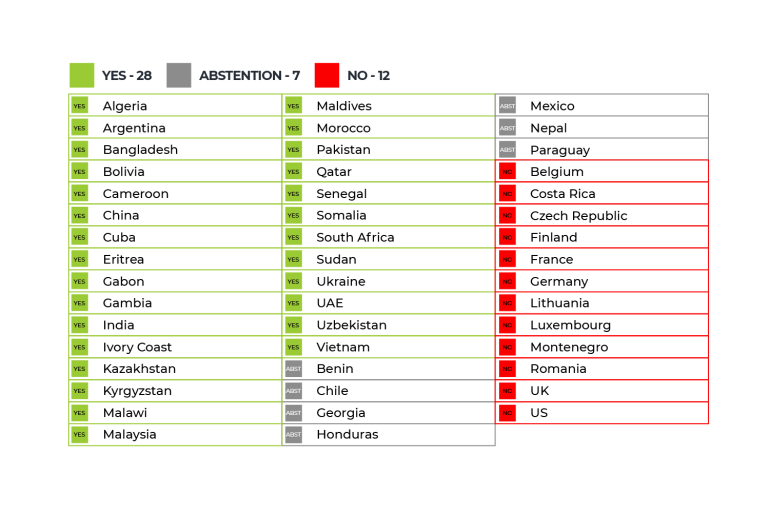The United Nations Human Rights Council motion after the Muslim holy book was desecrated in Sweden was disputed, but passed.

The United Nations Human Rights Council (UNHRC) has approved a resolution on religious hatred and bigotry in the wake of a Quran-burning stunt in Sweden that led to protests across the Muslim world.
The motion passed on Wednesday, but was opposed by the United States and the European Union, which said it conflicts with their positions on human rights and freedom of expression.
Pakistan and other Organisation of Islamic Cooperation countries, concerned by the incident last month outside Stockholm’s main mosque, during which an Iraqi immigrant desecrated the Quran on the Eid al-Adha holiday, had secured an urgent debate at the UN’s top rights body on Tuesday.
The resolution, among other things, called on countries to take steps to “prevent and prosecute acts and advocacy of religious hatred that constitute incitement to discrimination, hostility or violence”.
Pakistan’s Foreign Minister Bilawal Bhutto Zardari told the Geneva-based council via video on Tuesday: “We must see this clearly for what it is: incitement to religious hatred, discrimination and attempts to provoke violence.”
He said such acts occurred under “government sanction and with the sense of impunity”.
Bhutto Zardari’s remarks were echoed by ministers from Iran, Saudi Arabia and Indonesia.
“Stop abusing freedom of expression,” said Indonesia’s Foreign Minister Retno Marsudi. “Silence means complicity.”
UN human rights chief Volker Turk told the UNHRC that inflammatory acts against Muslims, as well as other religions or minorities, are “offensive, irresponsible and wrong”.
Sweden has condemned the Quran burning but maintains the country has a constitutionally-protected right to freedom of assembly, expression and demonstration.On Tuesday, France’s ambassador Jerome Bonnafont noted that human rights “protect people – not religions, doctrines, beliefs or their symbols … It is neither for the United Nations nor for states to define what is sacred”.
How did your country vote?
UNHRC resolutions are not legally binding but are seen as strong political commitments by states.
Tuesday’s motion called for countries to review their laws and plug gaps that may “impede the prevention and prosecution of acts and advocacy of religious hatred.”
Here is how countries voted:
Yes:
Algeria; Argentina; Bangladesh; Bolivia; Cameroon; China; Cuba; Eritrea; Gabon; Gambia; India; Ivory Coast; Kazakhstan; Kyrgyzstan; Malawi; Malaysia; Maldives; Morocco; Pakistan; Qatar; Senegal; Somalia; South Africa; Sudan; Ukraine; UAE; Uzbekistan; Vietnam
No:
Belgium; Costa Rica; Czech Republic; Finland; France; Germany; Lithuania; Luxembourg; Montenegro; Romania; UK; US
Abstained:
Benin; Chile; Georgia; Honduras; Mexico; Nepal; Paraguay
Post Disclaimer | Support Us
Support Us
The sailanmuslim.com web site entirely supported by individual donors and well wishers. If you regularly visit this site and wish to show your appreciation, or if you wish to see further development of sailanmuslim.com, please donate us
IMPORTANT : All content hosted on sailanmuslim.com is solely for non-commercial purposes and with the permission of original copyright holders. Any other use of the hosted content, such as for financial gain, requires express approval from the copyright owners.
 Sri lanka Muslims Web Portal Sri Lanka Muslims News Center
Sri lanka Muslims Web Portal Sri Lanka Muslims News Center
 Donate
Donate


